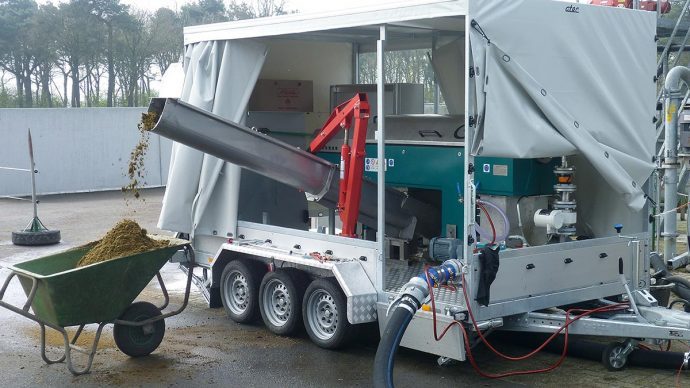In order to treat the livestock manure to enable the utilization of the associated nutrient surpluses, GEA has developed application-specific GEA manure Decanter lines. Through the continuous removal of solids and the high dewatering performance, the use of GEA decanters offers an efficient and economical solution for agriculture. The clarified manure is largely free of phosphate and can thus be spread on land without causing any environmental problems. Most of the phosphor is in the solid phase and can easily be transported to nutrient-deficient areas.
Soil-conserving application of the clarified manure is made possible by the reduction of nitrogen (N) and phosphate
(P2O5). The GEA manure Decanter separates 70% to 90% of the phosphate and 30% to 35% of the nitrogen
compounds and dewaters the solid particles to a compost-like crumbly consistency.
Due to the organic components, the solid discharged by the decanter is suitable for further processing into fertilizer
– for this it must be treated hygienically. This can be achieved by drying or composting. Subsequently, the solid can
be packed in commercial containers and sold as a valuable fertilizer. The separated liquid phase is applied as
before on the fields. The controlled fertilization effect relieves soil and groundwater.
A permanently installed manure processing plant consists essentially of a collecting tank template with stirrer, a
dewatering station with shredder, a product pump, a GEA manure Decanter, as well as the tank for clarified
manure. However, the decanter, including the necessary system components such as pumps and conveyor
technology can also be operated as a mobile system on a truck trailer or container. Thus, depending on the size, a
mobile decanter system can offer a capacity from 5 up to 100 m3 / h as a completely independent unit which can be
easily and quickly transported from farm to farm.
Further advantages of the GEA manure processing plant are the absence of any addition of chemicals, such as
flocculants, the particularly compact design, the simple system installation, the control via PLC and the automatic
adjustment to fluctuating feed quantities and characteristics. As there is no filtration system in use, blockages are
avoided.
The mechanical separation technology of GEA solves the problems of agriculture in two respects: on the one hand,
the EU’s most stringent regulations regarding groundwater and nature conservation are met; on the other hand
disposal, storage and transport costs are minimized.








